by [email protected] | Jul 7, 2021 | Prescriptions for your Practice
Podcast: Play in new window | Download
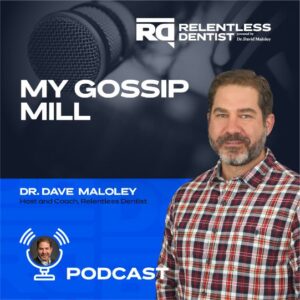 “Great minds discuss ideas; average minds discuss events; small minds discuss people.” — Eleanor Roosevelt
“Great minds discuss ideas; average minds discuss events; small minds discuss people.” — Eleanor Roosevelt
Many people find gossiping fun, enjoyable, and addictive until they become the focus of the idle talk. However, in a professional setup like the dental workplace, gossipmongering is an enormous time and productivity waster, not to mention unprofessional. In addition, it increases anxiety among employees, puts a strain on teamwork, erodes trust, and crushes morale.
Listen in as I provide steps on dispelling gossip before it enters the workplace, how dental owners should foster a culture of healthy conflict, and how to maintain an environment of high candor, high trust, and straightforward verbal communication.
Tune in and find solutions to common practice issues at Prescriptions for Your Practice.
Key Quotes:
- “I created a team training called “The 5 Habits That Destroy Team Unity” and we talk about it as a team.”
- “A lot of gossips comes from envy and jealousy.”
- “Gossip becomes addictive. Left to its own devices, it’s gonna run rampant, it’s gonna hijack your vision, it’s gonna destroy your well-being as doctors, it’s gonna divide team members, it’s gonna create unnecessary dramas, and none of that contributes to patient care.”
- “We want in a culture is a healthy conflict.”
- “We can create a team environment of high candor, high trust, and very direct verbal communication.”
- “Healthy conflict drives results without having to babysit the culture or nudging people to actually do their job.”
Featured on the Show:
- Dave Ramsey, Ramsey Solutions
- Newsletter: Does your practice have a Halftime? (See footer and subscribe to our email list to get the weekly newsletter.)
- I appreciate your feedback. Let me know what you learned and loved here: [email protected].


by [email protected] | Jun 30, 2021 | Prescriptions for your Practice
Podcast: Play in new window | Download
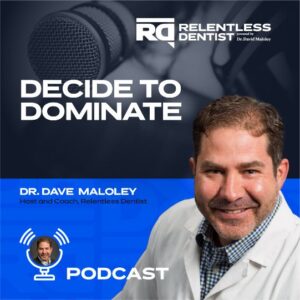
Decide to Dominate
Results are going to come from taking action. And all action starts with a decision.
Having to decide on something is naturally hard, most especially if the decision is transformative. However, decisive leadership is vital to effectively execute the plan of action toward achieving the organization’s goals.
This week’s podcast is about creating a culture of decisiveness, how to empower your team to make more and better decisions, the elements that make up a sound decision, and its impact on the organization’s overall well-being. We will also look into the psychology of “learned helplessness” — a situation where people deliberately put out a minimum viable effort to avoid trouble due to a vague instruction from a high-performance-seeking indecisive leader.
Tune in and find solutions to common practice issues at Prescriptions for Your Practice.
Key Quotes:
- “What was the number 1 characteristic of a high-performance culture or a high-performance team? I said immediately, DECISIVENESS.”
- “Decide to dominate. For me, dominate means dominating a day, knowing that we have, as a dental team, control over the day and an opportunity to get better than we were yesterday.”
- “If we’re not decisive, we can expect that our teams will also be indecisive.”
- “If we want results, we need to be decisive.”
- “If a team is consistently making more and better decisions across the board, it’s bound to generate more revenues, more fulfillment, and less stress.”
- “The quicker we make these decisions, the better off we’ll gonna be, the better off the organization is gonna be, and now we start to see the organization reflect the leader and become more decisive.”
- “We need to encourage our people to make mistakes and learn from them.”
- “The best thing you can do for your team is giving them reasons to stay hopeful and optimistic.”
Featured on the Show:


by [email protected] | Jun 23, 2021 | Prescriptions for your Practice
Podcast: Play in new window | Download
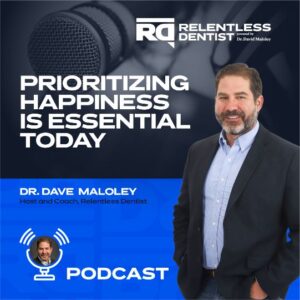
Prioritizing Happiness Is Essential Today
Money won’t make you happy, but happiness will make you money.
At this point in your life, you must be able to distinguish pleasure from happiness. Although both bring joy and good feelings, they produce contrasting outcomes. Pleasure is momentary and visceral, while happiness is long-lasting and transcendental.
Listen in as I dig deeper into the realities of happiness. We will talk about positive psychology and the narcissism epidemic brought about by the disruption in social media. We’ll also look at how we can prioritize happiness, what it looks like tactically, and what you can do to guarantee a culture of happiness in your practice.
Tune in and find solutions to common practice issues at Prescriptions for Your Practice.
Key Quotes:
- “How do we get so unhappy? This is not an ok thing to do, but it almost becomes a norm.”
- “We see it on social media all of the time where people lose their minds and hurt people. They unleash on someone else in a situation that doesn’t call for it.”
- “We need to figure out ways not only to get to function but how do we get to high function.”
- “Most of my adult life, I spent on this “I’ll be happy when” treadmill.”
- “I need to supplement my natural behaviors with tools that allow me to enjoy the day and the now and be more present.”
- “The one thing that’s taking us down right now is technology.”
- “We’re utilizing technology tools to help leverage and make our lives better, but if we’re not careful, it can be super destructive.”
- “Social media, the more we use it, the lonelier we get. We call it social, but it’s not social at all.”
- “In a dental practice, the five people that most likely you will spend your time with are the people on your payroll, so you have to be very selective.”
- “Happiness is a continuum.”
Featured on the Show:


by [email protected] | Jun 16, 2021 | Prescriptions for your Practice
Podcast: Play in new window | Download
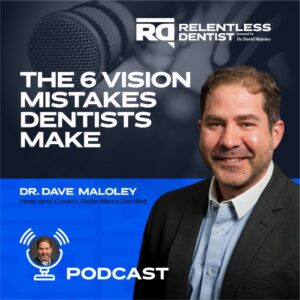 In this episode, I will expound on The 6 Vision Mistakes Dentists Make. I will discuss how crafting a clear vision supports the team’s growth and reinforces the practice effectively.
In this episode, I will expound on The 6 Vision Mistakes Dentists Make. I will discuss how crafting a clear vision supports the team’s growth and reinforces the practice effectively.
More than ever, dentists need to have a well-defined mission and a compelling vision to reinforce their practice, not only for themselves but also for their staff and patients. It provides a clear and consistent direction as to where the practice is going.
Faced with many challenges aggravated by these uncertain times, dentists need to run a successful business to avoid plateaus. One key aspect of strengthening the business is value-creation among the team steered by a well-executed vision. It has to be big enough to fit all of the employees’ dreams and hopes in it.
What does your practice look like five years from now?
Tune in and find solutions to common practice issues at Prescriptions for Your Practice
Key Quotes:
- “It’s important that we have a vision and we execute that properly.”
- “Execution without vision creates friction.”
- “Your vision has to be big enough to fit all of your employees’ dreams and hopes in it.”
- “Being flexible and strategy is important once we define our mission and our vision.”
- “Vision needs to stir excitement and emotion.”
- “We need to evolve as humans.”
- “We need to grow our practice by growing our people.”
- “Make sure that you’re willing to become something much more.”
Featured on the Show:


by [email protected] | Jun 2, 2021 | Prescriptions for your Practice
Podcast: Play in new window | Download
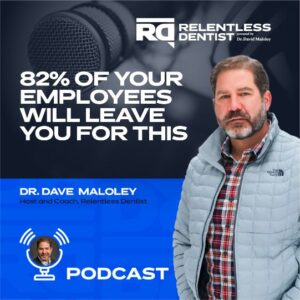 “We have two ears and one mouth so that we can listen twice as much as we speak.” — Epictetus
“We have two ears and one mouth so that we can listen twice as much as we speak.” — Epictetus
Listening is the single most essential skill in business, particularly in dental practice. Poor listening skills may lead to assumptions and misunderstanding that will eventually result in ineffective decisions and costly mistakes. It further deteriorates team cohesion and causes a lot of tension and stress.
Effective listening should be attentive, responsive, and active. Pay close attention to non-verbal expressions to understand and decode the messages correctly. Functional listening promotes healthy organizational relationships, encourages creativity and innovation, and fosters a positive culture among employees and the organization.
In this episode, I will talk about dental business owners retain great employees, nurture their growth, and provide them with tools for success to keep them dedicated to their practice, your leadership, and your customers — all because of active listening.
Tune in and find solutions to common dental practice issues at Prescriptions for Your Practice
Key Quotes:
- “When somebody leaves the nest and they graduate, these parents extend the trust that they will find good workplaces that take care of them.”
- “Good employees leave and you think that they leave for more money, but that’s not the case.”
- “The first key to active listening is giving someone all of your attention.”
- “The second step is to step into the conversations with genuine curiosity.”
- “Active listening means digging deeper because they don’t know how to articulate themselves and you need to ask exploratory questions.”
- “If you’re able to listen and they’re able to be heard, sometimes that’s enough for their needs to be met immediately.”
- “If you give your team, your patients, an undivided attention and you dive deeper to fully understand them, they will be committed and loyal to you and you can continue this reciprocal exchange because the offspring of active listening is trust.”
Featured on the Show:


 “Great minds discuss ideas; average minds discuss events; small minds discuss people.” — Eleanor Roosevelt
“Great minds discuss ideas; average minds discuss events; small minds discuss people.” — Eleanor Roosevelt





 “We have two ears and one mouth so that we can listen twice as much as we speak.” — Epictetus
“We have two ears and one mouth so that we can listen twice as much as we speak.” — Epictetus